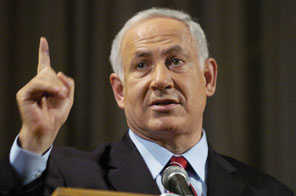Netanyahu gets home support in dispute with US
JERUSALEM: Top Israeli officials on Thursday rallied behind embattled Prime Minister Benjamin Netanyahu in his dispute with the U.S., deepening the rift between the two allies over Israeli construction in east Jerusalem.
Before Netanyahu returned Thursday afternoon from an unsuccessful visit to the United States, a string of Cabinet ministers declared that Israel would keep on building Jewish homes in east Jerusalem and accused Washington of unfairly putting pressure on the Israeli government.
The tough stance signaled further trouble for the U.S. as it tries to restart Israeli-Palestinian peace talks, which broke down more than a year ago.
Netanyahu left Washington after a last-ditch effort to clear the air with the Americans appeared to fail. The U.S. wants Israel to stop building Jewish homes in east Jerusalem — the section of the city that the Palestinians want as the capital of a future state.
Netanyahu refuses, saying the entire holy city must remain Israel's eternal capital.
Silvan Shalom, Netanyahu's deputy and sometimes rival in the ruling Likud Party, told Israel Radio on Thursday that he "completely supports" the prime minister, saying that the Jewish people's historical bond to Jerusalem is unbreakable.
"The subject of building in Jerusalem is unconditional, and if we blink we will lose everything," Shalom said, warning the government would collapse if Netanyahu backs down.
While he said the relationship with Washington is critical for Israel, he warned that "one-sided" pressure could backfire. In the past, perceived pressure from abroad has rallied Israelis around their leaders.
Interior Minister Eli Yishai, whose office oversees approval of new housing construction, pledged in a newspaper interview to keep on building in east Jerusalem.
"I thank God I have been given the opportunity to be the minister who approves the construction of thousands of housing units in Jerusalem," he said.
Netanyahu called a special meeting of senior Cabinet ministers after returning home.
Israeli newspapers described the situation as a full-blown crisis. Many commentators criticized Netanyahu for insisting on meeting with President Barack Obama at a time of disagreement. But reports also accused Obama of treating Netanyahu more like a Third World despot than the leader of a close ally.
Yediot Ahronot, Israel's largest newspaper, reported that during their White House meeting, Obama got up and told Netanyahu he was taking a break to have dinner with his family. "Let me know if there is anything new," it quoted Obama as saying. There was no official comment on the newspaper's report.
The fate of Jerusalem is the most explosive issue in the Israeli-Palestinian conflict.
Israel captured east Jerusalem from Jordan in the 1967 Mideast war and immediately annexed the area — a move that has never been recognized internationally. The Palestinians want east Jerusalem as the capital of a state that includes the West Bank and Gaza Strip.
Over the years, Israel has built a ring of Jewish neighborhoods in east Jerusalem to cement its control over the area. About 180,000 Israelis live in these neighborhoods, which the international community view as illegal settlements.
The Palestinians have refused to return to the negotiating table until Israel freezes construction in all settlements in the West Bank and east Jerusalem. Netanyahu has offered only to slow construction in the West Bank.
In neighboring Jordan, King Abdullah II warned Israel that it is playing with fire over its settlement policy and that the Jewish state must decide whether it wants peace or war.
The crisis with the U.S. erupted earlier this month when Israel announced during a visit to Israel by Vice President Joe Biden that it plans to build 1,600 new apartments in a Jewish neighborhood of east Jerusalem.
Biden condemned the move, and plans to resume peace talks through U.S. mediation were put on hold. The U.S. has asked Israel to cancel the plan.






